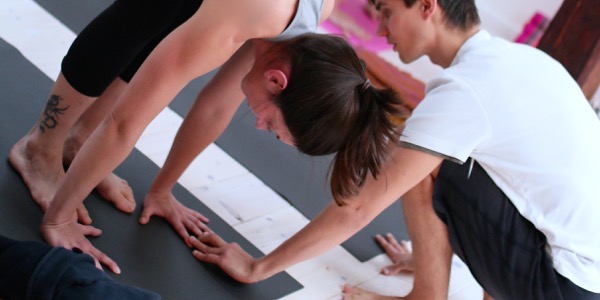Inquire More, Evaluate Less
As we go through our lives, every minute, hour and day our minds supply us with plenty of evaluations – and complaints – about what is happening around us and with us. It starts in the morning: Oh, I am really tired today, I never have a good day when I am already destroyed in the morning. Oh no, why is it raining and foggy today – how depressing.”
Once we get to our Yoga mat, we might experience thoughts like: “I feel lazy and tired, maybe no practice today! I am really stiff today.This practice is so hard! I feel like my practice is getting worse instead of improving. This stupid mat is so slippery.”
Those are just examples. My point is that we tent to evaluate a lot, finding reasons around us to make our day less promising as it could be instead of putting on an inquisitive mindset that might help us to move in a more desirable direction. I am not saying that commenting on what’s happening is always bad, but as we complain, we keep our mind on the problem and typically stay there.
Comments keep us attached to where we are at –
Asking positive questions moves us closer to where we want to be
There is a great power in asking questions (to ourselves and to others). Amazing things can happen if you ask more questions.
To make clear what I mean, here are some suggestions for the examples from above:
Oh, my body feels tired, how could I start my day to fully wake up? It’s raining – how can I dress to feel the most comfortable in this kind of weather? It’s foggy and depressive, what kind of breakfast cheers me up the most?
On the mat: How can I warm up my body to feel more flexible … deeper breaths, more muscular engagement? I am lacking motivation… How can I stay in the moment instead of thinking about the whole 90 min practice? I am slipping on the mat… how can I counteract that … more grounding, using an additional towel, …?
Always focus on the path and explore how to get there, without staying attached to what might be upsetting you at this very moment.
And what has all that to do with teaching?
Well, students tend to comment on their practice in a problem-focused way. (“I can’t do that! I am always falling over! My shoulders are too weak.! I have no balance!”)
As a teacher, we want to guide the student to a possible solution. If we hear how something is not working, instead of focusing on the “non-working” part and giving the complaining mindset of the student more attention, we can rather engage the explorative, inquisitive mindset and ask questions focused on the solution:
I am always falling over in headstand … well, ask yourself: Where do I have to engage to stay up and in my center of gravity? How do I strengthen my base and grounding in headstand? Where do my hips need to be in order to be balanced?
Asking the right kind of questions, to yourself and to your students, excites curiosity, encourages analysis and the use of personal experience and hence fortifies our understanding of the solution compared to a final solution that is just presented to us.
In this way the practitioner finds a solution that works for her/him and the teacher can use the process of guiding the student to the solution to apply her/his knowledge to the individual without giving standardized answers.
And both – teacher and practitioner – learn to trust more in themselves and develop more trust between each other.
Conclusion:
Observe yourself throughout the day, maybe start just in your Yoga practice and teaching. Catch every slightly negative comment that keeps you attached to the issue you are complaining about. Immediately think of what you would like the situation be instead and ask an inquisitive question whose answer may lead you to your desired solution. You will be amazed how your awareness of things around and within you changes.
I also want to invite you to ask me any question you might have about your path of practicing Yoga and sharing Yoga with others through teaching. You may leave a comment below or sign up for my newsletter below this article (just put in your first name and e-mail) which will give you my e-mail address to reply to with any question you might have plus some bonus material that you cannot find on the blog.
